Leveraging Libraries and Librarians for Africa’s Social Change and Sustainable Development in the 21st Century

MAY 12, 2024
Post by Lynn Jibril & Emmanuel Omeiza Momoh
The African continent faces several difficulties in addition to having a diverse range of cultures and environments. Poverty, instability, and environmental degradation are problems that people face everywhere, from the busy streets of Lagos to the isolated villages of Malawi. In spite of these difficulties, libraries are beginning to shine as rays of hope and are essential for promoting constructive change and sustainable growth.
Libraries are much more than simply locations to store books in the digital age; they are dynamic hubs of knowledge and agents of change. Think about Nairobi, a bustling city where libraries not only provide access to a wealth of information, but also run entrepreneurial initiatives that inspire young people to pursue their dreams and promote economic growth.
Similarly, libraries are collaborating with local health officials in rural regions such as the Eastern Cape, South Africa, to provide essential information on illness management and preventative treatment. Libraries are filling the access gap to healthcare services with creative programming and community engagement efforts, especially in underprivileged communities where medical resources are limited.
Aligning libraries with international development objectives like the African Union’s Agenda 2063 and the United Nations Sustainable Development Goals (SDGs) is one of the main forces behind this shift. These principles provide libraries a way forward for tackling urgent social concerns and making significant contributions to sustainable development.
For example, via literacy initiatives and workshops on skill development, libraries in Ghana are actively supporting women’s empowerment and gender equality. Libraries are dismantling obstacles and generating chances for social and economic growth by giving women access to resources and knowledge.
However, despite their good intentions, libraries often face significant challenges. In countries like Zimbabwe, where economic downturns and political upheaval are widespread, libraries suffer funding shortages and decaying infrastructure. They find it more challenging to fulfill their potential as change agents and to help their communities as a result.
Proactive action is required to get beyond these challenges. Through capacity development initiatives, librarians may gain the knowledge and abilities needed to successfully traverse the digital world and use technology to reach a wider audience. Additionally, collaborations with governmental organizations, non-profits, and businesses can offer much-needed financial and resource assistance.
For example, libraries and telecom firms are working together in Nigeria to offer free internet access to populations that do not have access to it. This facilitates information access while also encouraging digital literacy and enabling people to take part in the global economy.
Libraries may also use technology to reach out to remote locations and beyond physical borders. Mobile libraries are providing books and educational materials to remote areas in nations like Kenya, creating new avenues for education and personal development.
Librarians are increasingly acting as social change agents and environmental sustainability advocates in addition to their traditional function as information providers. Librarians in Uganda are spearheading campaigns to encourage conservation activities and increase public understanding of climate change. They are motivating people to take action and save the environment for coming generations by means of educational initiatives and community engagement projects.
Libraries also act as safe havens where a variety of viewpoints are valued and promoted. Libraries are essential for fostering communication and understanding amongst many ethnic groups in nations like Rwanda, where healing and reconciliation are continuous processes. They support attempts to promote social cohesiveness and peacebuilding by encouraging empathy and respect for one another.
Conclusively, libraries and librarians are essential partners in Africa’s fight for sustainable development and social transformation. They are fostering real development and enabling people to create better futures for all through their creative programs, community involvement projects, and advocacy work. It is time to acknowledge the priceless contributions made by libraries and librarians, and to assist them in their endeavors to build a society that is more sustainable, just, and equal.
About the Author
Lynn Jibril is an experienced Librarian and Educator, currently serving at the University of Botswana Library. With over twenty-five years of teaching experience in secondary schools, Mrs. Jibril holds a Master’s Degree in Library and Information Studies and a Diploma in Secondary Education. She is dedicated to imparting Information and Digital Literacy skills to university students and is particularly interested in Open Science issues, Open Educational Resources, Research Data Management, and Knowledge Management. Lynn is also a passionate Wikipedia editor and currently serves as the President of the Botswana Library Association. She can be reached on Jibrill@ub.ac.bw
Emmanuel Omeiza Momoh, a chartered Librarian certified by the Librarians Registration Council of Nigeria, is committed to addressing individual and corporate information needs. With scholarly publications on key Librarianship topics, Emmanuel is an active member of the World Literacy Foundation, the Young African Library Leaders Fellowship, and the United Nations Global Schools Advocacy Program for Sustainable Development. He has published scholarly works on important librarianship themes. He has presented at various conferences and he is a recent alumnus of the Young African Leadership Initiative Regional Leadership Center in Accra, Ghana. He can be reached on: momohomeiza8@yahoo.com.
Read more exciting stories and articles here: AFRICAN LIBRARY VIBES
Want to know how to contribute an interesting story or article to African Library Vibes? CLICK HERE TO CHECK OUT HOW TO DO SO.
